
04 Jun “Old School Parenting” on “Motherhood” Radio: Values, Discipline, & Authoritative Style for Modern-Day Families
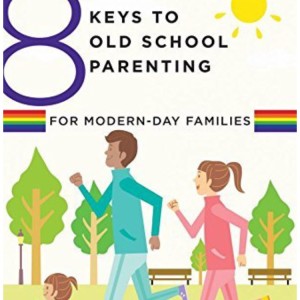 This week, I had an intriguing discussion on my new radio show, Motherhood, with Dr. Michael Mascolo, professor and author of 8 Keys to Old School Parenting for Modern Day Families. One hour was definitely not enough time for us to discuss all we wanted to on this topic!
This week, I had an intriguing discussion on my new radio show, Motherhood, with Dr. Michael Mascolo, professor and author of 8 Keys to Old School Parenting for Modern Day Families. One hour was definitely not enough time for us to discuss all we wanted to on this topic!
As a mom of six, four of whom are teenagers, I was excited to read Mike’s book and even more excited to bounce ideas off each other on what “old school parenting” means and how we can spice it up for our modern day needs. A few things stood out from our conversation that I wanted to share with you. I hope these will spark a few new, or old school, parenting ideas and strategies that will help your modern-day family!
Listen to the full episode of Motherhood: “Old School Parenting for the Modern Day” on demand now, or download the podcast at www.WebTalkRadio.com/internet-talk-radio/motherhood/!
Or,
Watch the video of this, and other “Motherhood” episodes, on my YouTube channel!
[stream provider=youtube flv=http%3A//www.youtube.com/watch%3Fv%3DxBEcmbm8nFI%26spfreload%3D10 img=x:/img.youtube.com/vi/xBEcmbm8nFI/0.jpg embed=false share=false width=640 height=360 dock=true controlbar=over bandwidth=high autostart=false responsive=16:9 /]
Old School Parenting for the Modern Day
1) Modern-day parenting tends to focus on a “child-centered” approach, which isn’t necessarily the best method.
I agree with Dr. Mascolo on this one. Though it started with good intentions, child-centered parenting puts the child’s values and wishes at the center, making the child the head of decision-making. Initially created as a backlash against the old ways of “adult-centered,” “My way or the highway” parenting, child-centered parenting has left children without the direction and values they desperately need. While we may want to foster creativity, individuality, confidence, and initiative, there are other, more effective ways to do this. Putting children at the center of parenting decisions may not be the best approach.
2) There are actually three well-known parenting styles, and the best approach lies in the middle—authoritative.
Family and parenting experts have long identified three styles of parenting: 1) Authoritarian—high direction and low warmth/support (“I’m the boss. Do what I say,” or adult-centered parenting), 2) Permissive—low direction and high warmth/support (“I love and trust you. You can do whatever you want,” or child-centered parenting), and 3) Authoritative—high direction and high warmth/support (“I have high expectations for you, and encourage you to set high standards for yourself. I will do all I can to help you achieve them.”)
Authoritative parenting has long been shown to be the most effective parenting style, helping children gain confidence and feel loved and supported while also holding them to high standards and values and directing them in how to live up to them.
3) We are responsible for teaching our children morals and values, and we must model and start the conversation about these—today.
Unfortunately, in today’s world, it’s become almost taboo to talk about morals and values. Yet, we can 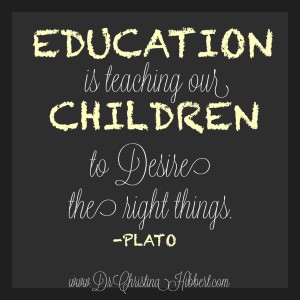 respect one another’s differences while still teaching and expecting our children (and ourselves) to live up to high moral values. Values like kindness, goodness, virtue, compassion, contribution, peace, spirituality, and so forth, encourage our children to become the best they can be and to help make this world better.
respect one another’s differences while still teaching and expecting our children (and ourselves) to live up to high moral values. Values like kindness, goodness, virtue, compassion, contribution, peace, spirituality, and so forth, encourage our children to become the best they can be and to help make this world better.
One of the best ways to teach children morals and values is to live them ourselves. Ask yourself:
- Am I modeling for my child/ren the things I want them to embrace and become?
- Do I talk about/discuss these things regularly with them?
- Do they know which values I value most?
If not, isn’t it time to start the conversation? It’s never too late to begin.
4) We can also, and should also, help children discover who they would like to be.
Sure, we can watch and help them identify the traits, talents, and possibilities for their future, but what about asking them what they think? This was a point Dr. Mascolo brought up in our interview, and it really struck me. It made me wonder if I had truly taken the time to ask and listen to what my kids feel about this. You and I can both start now, and ask our child/ren:
- “Who would you like to become?” “How would you like to be in this world?”
- “What does it mean to you to be a good self?”
- “What does it mean to you to be a good person?”
5) “We’re in the business of making children care. That’s what we do.”
A direct quote from Dr. Mascolo, from our interview, and one that I love. Yes! We show them, “Like this. Don’t like that. Do this. Don’t do that,” and it’s okay! It’s not only okay to show our children what to like, do, and care about, it’s our primary responsibility as parents to show them the way. As Plato said, “Education is teaching our children to desire the right things.” Yes! If we don’t show our children what is right, then who will? It’s our job. It’s one of the best ways we can love our children–guiding them, directing them, showing them the light. Then, we teach them self-discipline and motivation so they will choose to follow it.
6) Understand the difference between punishment and discipline.
Discipline teaches something. It’s about helping the child learn to ultimately discipline him/herself. It’s 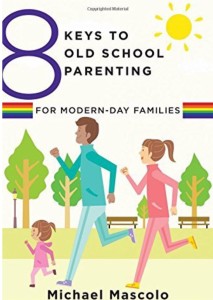 about instilling self-discipline in the child, about creating motivation in the child to follow what’s right and good on their own.
about instilling self-discipline in the child, about creating motivation in the child to follow what’s right and good on their own.
Punishment, on the other hand, focuses on instilling a negative consequence to discourage unwanted behavior. Dr. Mascolo is not a fan of punishment and states that it only works when 1) the punisher is around, and 2) the punishment is severe enough.
I still believe in helping children face consequences, and Dr. Mascolo does, too, in some situations. Often, kids need a good old consequence to help them learn from their mistakes. Additionally, I do agree that our main focus should be on teaching our children through discipline. This means that we don’t go too easy on our kids, but also that we seek ways to motivate them toward good behavior, versus punishing them out of bad behavior.
7) This model, “Authoritative Discipline in 5 Easy Steps,” is a helpful way to know how to discipline our kids in ways that promote learning, motivation, and self-discipline.
Dr. Mascolo outlines 5 Steps that can be helpful in healthy discipline, in his book (from key 3):
1) Stop the unwanted behavior. (Stop walking away from me when I call you to dinner.)
2) Acknowledge the child’s feeling/interest (I know you don’t want to eat with us because you don’t like the dinner and you’d rather stay in your room.)
3) State what they did wrong or the rule the child violated. (The rule is that we eat dinner together, even if you don’t love what I make for dinner, and especially that you do not ignore me when I call you to eat.)
4) Provide “interest-relevant consequences,” as needed. (If you continue to ignore me, then you will have to sit on the porch until you’re ready to come and sit with us.)
5) Provide an alternative response. (When you’re ready to treat me with respect and come to the table, you may join us, and I’ll help you find some food you like from the choices I’ve provided for dinner tonight.)
8) One of my very favorite things from this book is the following statement, which in my opinion, summarizes all of this up. I’m actually planning to sit my older kids down and read this to them; it applies so perfectly to where I currently am in my parenting journey!
“I am your parent. I’m not your friend, your colleague, your maid, or your chauffeur. You are not my equal. I am responsible for your safety and development. I am here to teach you how to be successful in the world. Why is this? For one thing, I brought you into this world…For another, I love you and don’t want anything bad to happen to you. But more important, it’s because—right now, and for the most important things—I know more than you do. I know things you need to know to be successful in the world. And I have a better understanding of what’s good for you than you do…I’m going to make mistakes, but when I do, they will be honest mistakes, mistakes I’ve made because I did what was right for you in the moment…However, know this: If you fail to do the right thing, you’re going to find me right there, showing you the way until you can get it right…You are my son or daughter and you’re stuck with me…I’m here to help you get what you want out of life, but to help you to do it in the right way…Why? Because I am your parent. I’m not your friend, your playmate, your maid or your chauffeur…” (page 3)
Old school or not, that’s my idea of courageous, valiant, loving, modern parenting.
~For more on these and the other “8 Keys to Old School Parenting for Modern Day Families,” check out Dr. Michael Mascolo’s book, on Amazon or Norton.com!
What do you think about adult-centered, child-centered, and authoritative parenting styles? What are your thoughts on these “old school for modern day” parenting ideas? How do you feel it’s best to discipline children? What strategies feel most successful for you? Leave your opinions and suggestions below, in the comments!
Be sure to check out this and other exciting episodes of Motherhood on WebTalkRadio.net!
Weekly episdoes ready on demand or to download and share!
You may manage your subscription options from your profile.
Be sure to check out my bestselling, award-winning memoir, This is How We Grow!
Available now at Amazon or Barnes & Noble!
NEW! My latest book, “Who Am I Without You,” is available now at
Target, Amazon, Barnes & Noble, New Harbinger, or your local bookseller!
Let’s Connect!
SUBSCRIBE, above, “Like” me on Facebook Dr. Christina Hibbert; This Is How We Grow, & follow me on Twitter,Pinterest, & Instagram!
Related Posts/Articles:
Personal Growth & Self-Actualization: What Will Your Choice Be?
Parenting Success: It’s More about the Parent than the Child
16 Things I’d Like My Postpartum Self To Know, 6 Kids & 16 Years Later (PSI Blog Hop 2013)
Join my Free, Online “This Is How We Grow” Personal Growth Group!
“This is How We Grow:” Understanding the Seasons of Personal Growth
10 Ways I Choose to Grow Each Day

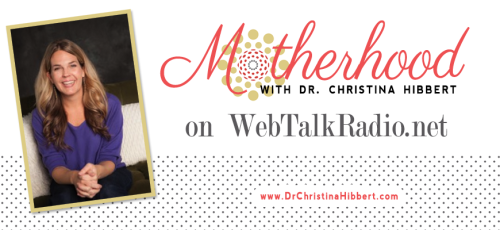

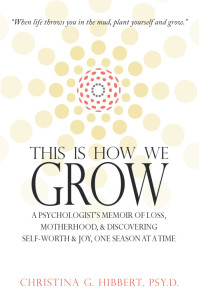
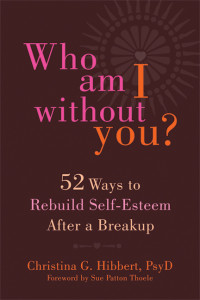
Hi Christina, I really like how you have presented this article. Firstly I have not heard “We’re in the business of making children care. That’s what we do.” before. I would love to see that expanded into a full article.
Also within my own circle I have become very aware of parents wanting to be their child’s friend. I am not sure what that is about but I get the impression it is very permissive and not good for either parent or child. Do you have any suggestion on how to maybe influence/guide those parents. It seems wrong not to say anything.
Many Thanks
Stay Well Stay Happy
John